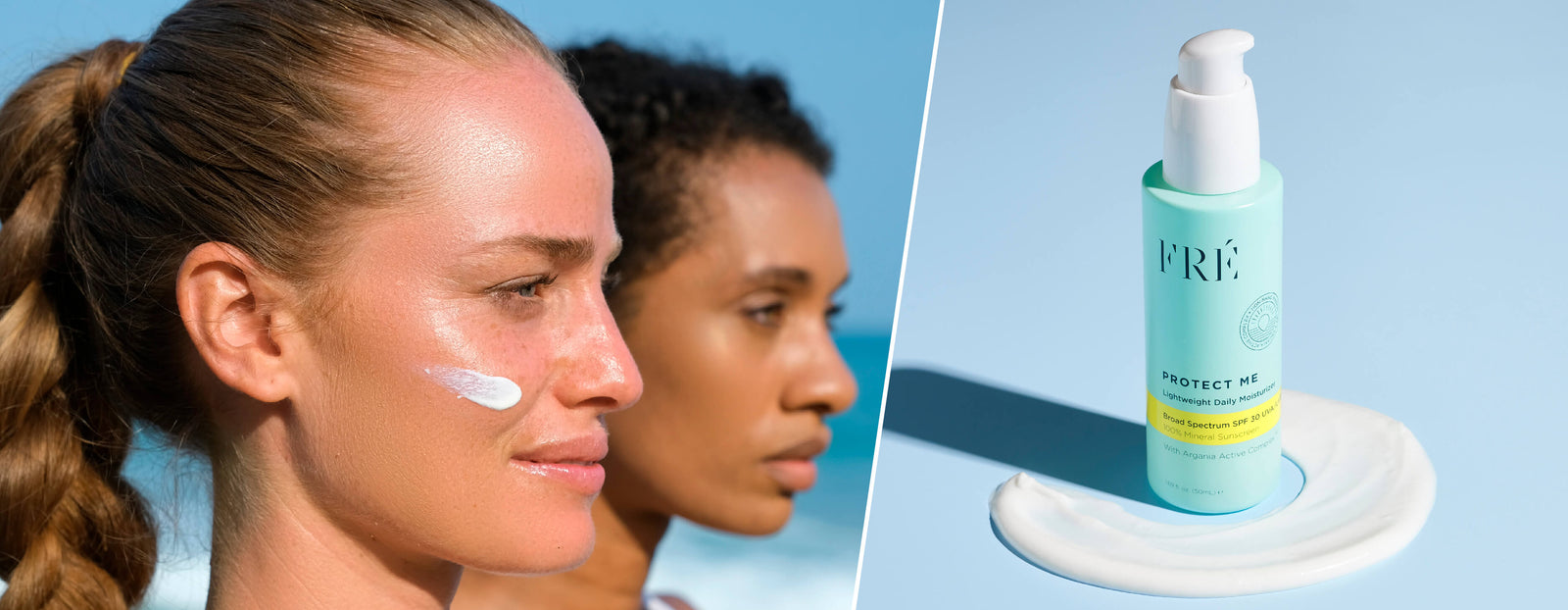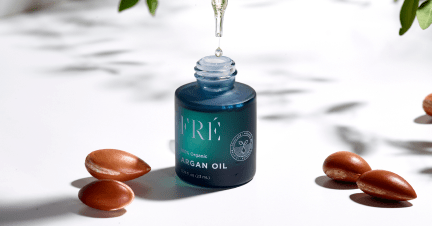Shop All
ABOUT FRE
Meet Argania Active Complex™ (AAC). Our unique patented formula, designed for your active life.
Mineral vs Chemical Sunscreen - Which Is Better?
by Jude Jacob April 03, 2023

When it comes to protecting our skin from the sun's harmful rays, sunscreen is a must. But not all sunscreens are created equal. In fact, there are two main types of sunscreen: mineral and chemical. While both types can provide sun protection, mineral sunscreen has become increasingly popular for its unique benefits. In this blog, we'll explore why mineral sunscreen is different and better than chemical sunscreen.
Mineral vs. chemical sunscreen
First, let's break down the difference between mineral and chemical sunscreen. Chemical sunscreen contains ingredients that the skin absorbs and create a chemical reaction to block UV rays. Mineral sunscreen, on the other hand, uses natural minerals like zinc oxide and titanium dioxide to physically block the sun's rays from penetrating the skin. This means that mineral sunscreen sits on top of the skin, forming a barrier that reflects and scatters UV rays.
Mineral or chemical sunscreen for Sensitive skin?
Mineral sunscreen is better for sensitive skin. Because it sits on top of the skin, it is less likely to cause irritation or allergic reactions. Many chemical sunscreens contain ingredients that can be harsh on sensitive skin, such as oxybenzone and avobenzone. These chemicals can cause stinging, burning, and even rashes in some people. Mineral sunscreen is a great alternative for those with sensitive skin or those who have had allergic reactions to chemical sunscreen in the past.
Mineral sunscreen is less likely to cause irritation or allergic reactions.
Sunscreen and “wait time”
Another benefit of mineral sunscreen is that it starts working as soon as it is applied. Chemical sunscreen, on the other hand, needs time to be absorbed by the skin before it becomes effective. It can take up to 15 minutes for the skin to fully absorb chemical sunscreen. This means that if you apply chemical sunscreen and immediately go outside, you may not be fully protected. Mineral sunscreen provides immediate protection, making it a great choice for those who are on the go.
Mineral sunscreen starts working as soon as it is applied.
Sunscreen’s sensitivity to light
Mineral sunscreen also has a longer shelf life than chemical sunscreen. Chemical sunscreen can break down over time, especially if it is exposed to heat or light. Mineral sunscreen, on the other hand, is more stable and can last longer. This means that you can stock up on mineral sunscreen and not have to worry about it going bad before you can use it all up, and it also tends to last longer on your skin. This sensitivity to light also is the case when you are wearing sunscreen; chemical sunscreens will break down more quickly in direct sunlight than mineral sunscreens. And as a result, you will need to reapply chemical sunscreen more often than mineral sunscreen.
Sunscreen’s effect on marine life
Mineral sunscreen is reef safe since it’s formulated with ingredients that are non-toxic to coral reefs and marine life. Chemical sunscreens, on the other hand, contain ingredients such as oxybenzone and octinoxate that have been shown to harm coral reefs and contribute to coral bleaching. This is a major issue, as coral reefs provide habitat for countless marine species and are a crucial part of our ocean's ecosystem. By using reef-safe mineral sunscreen, we can protect our skin without harming the environment.
Mineral sunscreen is reef safe since it’s formulated with ingredients that are non-toxic to coral reefs and marine life.
Making mineral sunscreen part of your skincare routine
So, now that we've covered the benefits of mineral sunscreen, you may be wondering how to incorporate it into your skincare routine. This is where PROTECT ME MINERAL comes in.
This lightweight, factor 30 broad spectrum sunscreen is waterproof for up to 40 minutes. Its active ingredient is non nano zinc oxide, which provides mineral UV protection. PROTECT ME MINERAL has an ultra sheer formula that rubs into skin easily without leaving a white, sticky residue. In addition, it contains FRÉ's proprietary Argan Extracts patent, which not only protects and repairs skin from sun damage and premature aging, it also boosts hydration. Use it daily as the final step of your morning skincare routine for healthy looking skin that’s protected from the sun.
It is vegan and cruelty-free, making it a conscious choice for both your skin and the planet.
When it comes to applying mineral sunscreen, it's important to use enough and to reapply every two hours, especially if you are swimming or sweating. A good rule of thumb is to use a quarter-sized amount for your face and a shot glass-sized amount for your body.
Choose mineral sunscreen
In conclusion, mineral sunscreen is an excellent choice for anyone looking to protect their skin from the sun's harmful rays. Its unique benefits include suitability for sensitive skin, immediate effectiveness, and more stability when exposed to light. It also is reef safe, making it a better choice when considering the environment. When looking for a mineral sunscreen, choose one that is easy to apply and boosts skin hydration, like PROTECT ME, and enjoy your time outdoors without worrying about your skin.
Leave a comment
Comments will be approved before showing up.






